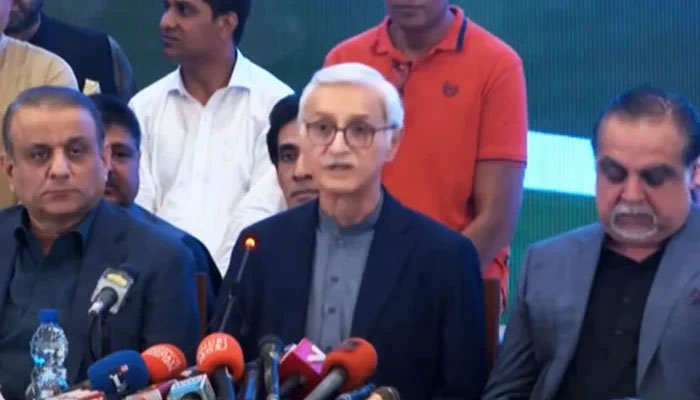30 more ex-MPAs likely to join IPP in Punjab
IPP chief Jahangir Tareen has intensified political contacts across the country after returning home
LAHORE: More than 30 more former parliamentarians in Punjab are likely to join the newly formed Istehkam-e-Pakistan Party (IPP), after Jahangir Tareen’s political contacts, The News has learnt.
Jahangir Tareen, the head of the IPP, has intensified political contacts across the country after returning home.
According to sources, Tareen and Aleem Khan will meet various political figures in Lahore, Islamabad and Karachi in the next few days, while the party leadership has also established contacts with major political figures of Khyber-Pakhtunkhwa.
According to sources, the process of the party’s registration with the Election Commission of Pakistan (ECP) will also be completed this week. After approval of Jahangir Tareen and Aleem Khan, an application will be submitted to the ECP.
The party leadership is confident in its stability, paving the way for an extensive membership campaign. To facilitate it, large-scale membership camps will be organised, with the central leadership overseeing the drive closely.
On June 12, 2023, Tareen had appointed former food minister Aleem Khan as the IPP’s first president, Aamir Mehmood Kiani as the first secretary-general, and Aoun Chaudhry as the additional secretary-general and spokesperson.
Although Tareen’s disqualification by the courts prevents him from holding any official position within the IPP, he is regarded as the party’s ‘patron-in-chief’.
Moreover, as part of its preparations for the 2023 election, the IPP also unveiled divisional committees across Punjab on June 20, 2023.
-
 King Charles Makes It ‘absolutely Clear’ He Wants To Solve Royal Crisis
King Charles Makes It ‘absolutely Clear’ He Wants To Solve Royal Crisis -
 Royal Family Warned To ‘have Answers’ Amid Weak Standing
Royal Family Warned To ‘have Answers’ Amid Weak Standing -
 Marc Anthony On Why Bad Bunny’s Super Bowl Show Mattered
Marc Anthony On Why Bad Bunny’s Super Bowl Show Mattered -
 Kid Rock Gets Honest About Bad Bunny’s Performance At Super Bowl
Kid Rock Gets Honest About Bad Bunny’s Performance At Super Bowl -
 Kylie Jenner Reveals Real Story Behind Her 'The Moment' Casting
Kylie Jenner Reveals Real Story Behind Her 'The Moment' Casting -
 Eva Mendes Reveals One Costar She Envied Ryan Gosling Over
Eva Mendes Reveals One Costar She Envied Ryan Gosling Over -
 Halsey Marks Fiancé Avan Jogia's Birthday With Emotional Note
Halsey Marks Fiancé Avan Jogia's Birthday With Emotional Note -
 China: Stunning Drone Show Lights Up Night Sky Ahead Of Spring Festival 2026
China: Stunning Drone Show Lights Up Night Sky Ahead Of Spring Festival 2026 -
 Andrew's Epstein Scandal: Will King Charles Abdicate Following King Edward's Footsteps?
Andrew's Epstein Scandal: Will King Charles Abdicate Following King Edward's Footsteps? -
 Billy Joel Leaves Loved Ones Worried With His 'dangerous' Comeback
Billy Joel Leaves Loved Ones Worried With His 'dangerous' Comeback -
 Prince William Dodges Humiliating Question In Saudi Arabia
Prince William Dodges Humiliating Question In Saudi Arabia -
 Dax Shepard Describes 'peaceful' Feeling During Near-fatal Crash
Dax Shepard Describes 'peaceful' Feeling During Near-fatal Crash -
 Steve Martin Says THIS Film Has His Most Funny Scene
Steve Martin Says THIS Film Has His Most Funny Scene -
 Kensington Palace Shares Update As Prince William Continues Saudi Arabia Visit
Kensington Palace Shares Update As Prince William Continues Saudi Arabia Visit -
 Fugitive Crypto Scammer Jailed For 20 Years In $73m Global Fraud
Fugitive Crypto Scammer Jailed For 20 Years In $73m Global Fraud -
 Will Andrew Mountbatten-Windsor Finally Go To Jail Now That King Charles Has Spoken Out? Expert Answers
Will Andrew Mountbatten-Windsor Finally Go To Jail Now That King Charles Has Spoken Out? Expert Answers




